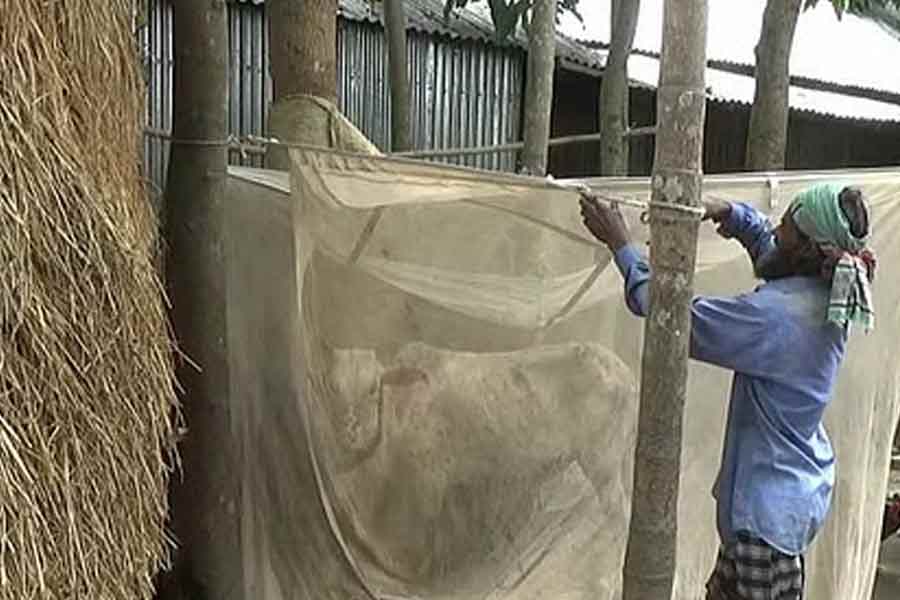
Published :
Updated :

The lumpy skin disease of cattle has spread to several districts and caused deaths among cows, which threatens to dent their business with the ritual of animal sacrifice during Eid-ul-Azha less than two weeks away.
In the past two and a half months, 200-250 cows died of the disease in Sylhet, 20-25 in Barguna and seven to eight in Netrokona. Cattle in Mymensingh, Jashore and Sherpur have also been infected with the viral disease, reports bdnews24.com.
Lumpy skin disease (LSD) is transmitted by blood-feeding insects, such as certain species of flies and mosquitoes, or ticks.
It causes fever, nodules on the skin and can also lead to death, especially in animals that have not previously been exposed to the virus.
Infected cattle also may develop edematous swelling in their limbs and exhibit lameness.
The virus has important economic implications since affected animals tend to have permanent damage to their skin, lowering the commercial value of their hide.
Additionally, the disease often results in chronic debility, reduced milk production, poor growth, infertility, abortion, and sometimes death.
In Bangladesh, the disease was first spotted in imported cattle a decade ago. It has spread in the past five years, according to officials at the Department of Livestock Services.
They said cattle infected with LSD cannot be slaughtered for meat. It is also forbidden in Islam to sacrifice sick or injured animals.
Regular vaccination of cattle and keeping them safe from insect bites and away from infected cows can prevent LSD, but vaccines are not often available in Bangladesh.
There is no direct antiviral treatment for lumpy skin disease.
CASH FLOWING OUT
In Netrokona, farmers said many cows have been infected with LSD.
According to the local office of the Department of Livestock Services, 42,000 or 7 per cent of the around 600,000 cows in the district have been infected in the past two months.
The department vaccinated 12,700 cows, distributed awareness leaflets among farmers and sat with them.
One of the farmers, Mohammad Shamsuddin, said two of his four cows have been infected and he was trying hard to save them as seven to eight cows died of the disease in his village.
“I’ve spent Tk 10,000-12,000 for their treatment. I’m preparing more cash to spend,” he said, calling for authorities to send government veterinarians in the villages to lower the cost of treatment.
Farmer Mojibur Rahman said he reared nine cows and planned to sell three of them this Eid to repay loans. Now four of the cows have caught LSD. “It seems I won’t be able to sell the cows. I am at my wit’s end.”
Another villager, Shilpi Akter, said two of her four cows caught the disease. “After watching eight of the cows in my village die, I am concerned about my cattle. I’m doing whatever anyone is advising. I’ve borrowed money for their treatment while I was supposed to repay old loans by selling them.”
Reazul Haque, a director at the Department of Livestock Services, said no medicine other than painkillers can be given to the infected cows. “There are some home remedies. Our officers are informing the marginal farmers about these remedies.”
Netrokona Livestock Officer Mohammad Wahedul Alam said the disease spread across the country. “We hope the rate of infection will decrease along with mosquitoes and flies after rains.”
He said as long as there is no treatment of LSD, the farmers should keep the cowsheds clean and free from insects.
If a cow is infected, antibiotics and antihistamines are given as secondary treatment, according to him.
Nabanita Sarker, chief of Kanaighat Upazila Livestock Hospital, said it takes three to four months for an infected cow to recover from the disease.
She advised farmers to have patience and take care of infected cows.
PREVENTION
Veterinarians suggest several steps to prevent lumpy skin disease or comfort infected cows. They are:
– Vaccinate cows regularly, although the vaccines are not often available in Bangladesh.
– Keep the farm and its surroundings clean so that infects cannot bite the cows.
– Stop using things from farms where a cow has been infected.
– Isolate the infected cow and keep it inside the mosquito net.
– Bury the milk from infected cows.
– Change clothes after taking care of an infected cow and before going near a healthy one.
– Keep the things used by an infected cow away from healthy ones.
– Regularly cleanse the nodules with tincture of iodine.


 For all latest news, follow The Financial Express Google News channel.
For all latest news, follow The Financial Express Google News channel.